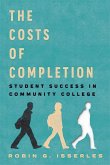This book focuses on the role of self-regulation of learning, self-efficacy beliefs, and academic delay of gratification as three important components necessary to ascertain academic achievement through successful homework completion among college students. In an attempt to understand the role of homework that so much affect parents, students, and educators, this book reports new findings associating positive outcomes of homework with self-regulation of learning and motivational beliefs. The important contribution of this book rest on its emphasis on learners as proactive agents who focus on goals, intrinsic motivation, outcome expectations, self-monitoring, and self-evaluation in order to attain valuable academic goals. This book is grounded in the premise that students, teachers, administrators, and policy makers can orchestrate their efforts to empower students with self-regulatory learning strategies, appropriate motivational beliefs, and academic knowledge and skills.
Bitte wählen Sie Ihr Anliegen aus.
Rechnungen
Retourenschein anfordern
Bestellstatus
Storno








